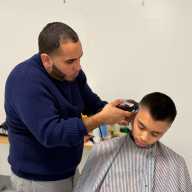Read Related Article #1: U.S. was a mecca
Read Related Article #2: Culture
Read Related Article #3: Survivor Profile: Inge Auerbacher
Read Related Article #4: 60 years later
Read Related Article #5: Survivor Profile: Hannah Deutch
Read Related Article #6: Second generation survivors react
Read Related Article #7: Survivor Profile: Jane Keibel
Read Related Article #8: Survivor Profile: Ann Klamka
The horrors of the Holocaust reached many nations. As a little girl in Greece, Lena Casuto Goren saw how life went from being “fantastic” to being one spent in hiding and in fear.
Born in Salonica, Greece in 1930, Goren and her parents moved to Larissa when she was only a year old. While there, her mother gave birth to her younger sister and brother. Her father was the chief rabbi of Larissa and taught Hebrew school.
“The seven years prior to the war, they were wonderful years,” Goren said. “It was a great life.”
Goren said that things changed in Larissa on October 28, 1940, which was the day that the Italians and Greeks entered World War II. By 1941, Goren said fears had grown stronger. On December 21 of that year, Goren, her sister, and a friend were standing in the street when German planes began to fly over them and soon started dropping bombs.
Goren’s father was at one point arrested by the Germans, who demanded he give them a list of Larissa’s Jews and tell them where they were hiding. Although he did not give them the information, he was still released.
Shortly after that incident, the mayor of the town told Goren’s father that, as soon as the following day, the Germans were going to start rounding up the Jews and then would begin deporting them to camps. Goren said her father went to each house to warn them of what was coming, and that about 80 left with their family.
After what Goren said seemed like an endless walk, they ended up at a monastery in Tzouma. They remained there for 18 months.
When the war ended in 1945, Goren, her parents and her siblings returned to Larissa, where her father went back to work and they tried to resume a normal life.
“The rest of the family died in concentration camps - cousins, uncles, aunts - everybody died in concentration camps,” Goren said.
Goren’s family finally moved to the United States in 1948, just a couple of weeks prior to her 18th birthday. She had an aunt living in Ohio who sponsored them.
“It was the worst experience that anybody can have,” Goren said of her move.
Because of not being able to speak English and not knowing anyone, Goren said that she felt very lonely and lost in the shuffle. It took her about a year to adjust. She said she did not immediately talk about her experiences during the war.
“It’s too painful, so for a long time none of us talked about a lot of things,” she said.
Goren first came to New York City in 1949. She eventually started working as an official Greek interpreter for the city’s court system and later in life became a member of Ms. Senior America. Now a resident of Rego Park, Goren has two children and three grandchildren. She said that she is very proud of who she is and what she has accomplished.
In 1996, Goren began talking more about the Holocaust, saying that she wants to make people aware of what happened in Greece. She also said that it had a great impact on her life, and that she tries to show people the kindness that was shown to her when she was in need.
“The will to survive, the will to live, has been in me since the day I was born,” Goren said. “I always do whatever I can to make life better for me and the people I’m in contact with.”





























